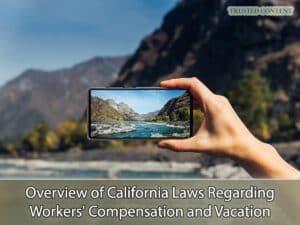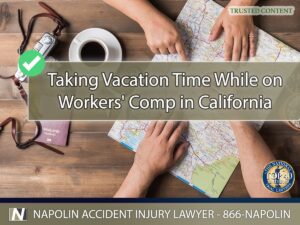Taking Vacation Time While on Workers’ Compensation in California
Understanding the intricacies of workers' compensation in California is crucial for employees who have sustained injuries on the job. Navigating these complexities becomes even more challenging when considering a vacation during the recovery period. This article aims to inform injured workers in southern California about their rights and the legal considerations involved in taking a vacation while receiving workers' compensation benefits.

What Workers' Compensation is Like in California
What Workers' Compensation is Like in California
Workers' compensation is a state-mandated insurance program that provides benefits to employees who suffer work-related injuries or illnesses. In California, workers' compensation covers medical expenses, rehabilitation costs, and a portion of lost wages due to the injury. The primary goal of workers' compensation is to ensure that injured workers receive the necessary medical care and financial support to recover and return to work.
Types of Benefits Covered Under California Workers' Compensation
Workers' compensation in California typically includes several types of benefits:
- Medical treatment: Covers the cost of medical care related to the injury.
- Temporary disability benefits: Provides partial wage replacement while the employee is unable to work.
- Permanent disability benefits: Compensation for permanent impairments resulting from the injury.
- Supplemental job displacement benefits: Vouchers for retraining or skill enhancement if the employee cannot return to their previous job.
- Death benefits: Financial support for the dependents of a worker who dies due to a work-related injury or illness.
Eligibility Criteria for Workers' Compensation Benefits
To qualify for workers' compensation benefits in California, an employee must have sustained an injury or illness arising out of and in the course of employment. This includes both sudden accidents and repetitive stress injuries. The injury must be reported to the employer promptly, and the employee must follow the proper procedures for filing a workers' compensation claim.
Going on Vacation While Receiving Workers' Compensation
Taking a vacation while on workers' compensation involves several legal considerations. It is legal to go on vacation, but injured workers must be aware of potential impacts on their benefits and obligations. The key is to ensure that vacation plans do not interfere with medical treatments or violate any workers' compensation regulations.
Consulting with Your Workers' Compensation Attorney
Consulting with a workers' compensation attorney is a crucial first step. An attorney can provide personalized advice based on the specifics of the case and help navigate any potential legal issues. The attorney can also communicate with the workers' compensation insurance carrier on behalf of the injured worker to clarify any requirements or restrictions regarding vacation plans.
Notifying Your Employer and Insurance Carrier
Notifying both the employer and the workers' compensation insurance carrier of vacation plans is highly recommended. This notification should include details of the planned vacation, including dates and destination. Providing this information helps ensure transparency and allows the insurance carrier to monitor compliance with the treatment plan.
Ensuring Vacation Plans Do Not Conflict with Medical Appointments
Scheduling medical appointments around vacation plans is critical to avoid any conflicts. Injured workers should coordinate with their healthcare providers to ensure that necessary treatments and appointments are not missed during the vacation period. This coordination helps maintain the continuity of medical care and supports the injured worker's recovery process.

Overview of California Laws Regarding Workers' Compensation and Vacation
Overview of California Laws Regarding Workers' Compensation and Vacation
California workers' compensation laws do not explicitly prohibit taking a vacation while receiving benefits. However, the critical factor is whether the vacation interferes with the injured worker's recovery or compliance with medical treatment. If a vacation is perceived to hinder recovery or violates any conditions set by the insurance carrier, it can lead to complications in the claim process.
Consequences of Violating Workers' Compensation Regulations
Failing to comply with workers' compensation regulations can lead to significant consequences, including:
- Suspension of benefits: Temporary disability benefits may be suspended if the injured worker is found to be non-compliant with medical treatment or fails to report significant changes in condition.
- Claim denial: In severe cases, the entire workers' compensation claim can be denied, leading to a loss of all benefits.
- Legal action: Insurance carriers may take legal action against workers who fraudulently claim benefits while engaging in activities that contradict their injury claims.
Tips for Maintaining Compliance While on Vacation
To ensure compliance while on vacation, workers should:
- Scheduling appointments in advance: Plan medical visits well in advance to avoid conflicts with vacation dates.
- Communicate with healthcare providers: Inform doctors about vacation plans to receive guidance on managing treatment during the absence.
- Utilize telemedicine: When appropriate, consider using telemedicine options to maintain medical consultations while away.
- Avoid activities that could exacerbate the injury or contradict medical restrictions.
Importance of Keeping Detailed Records
Keeping detailed records of vacation plans helps ensure transparency and compliance. Records should include:
- Dates and destinations of the vacation.
- Notification letters to the employer and insurance carrier.
- Medical information before and after the vacation, including treatment descriptions, appointments, and telemedicine consultations.
- Receipts or itineraries related to travel and accommodation to demonstrate the timeline and activities of the vacation.

Taking Vacation Time While on Workers' Compensation in California
Taking Vacation Time While on Workers' Compensation in California
Navigating the complexities of workers' compensation while planning a vacation requires careful consideration and compliance with legal and medical requirements. Injured workers in southern California must ensure that their vacation plans do not interfere with their recovery or violate any workers' compensation regulations.
For those needing legal assistance, contacting a knowledgeable workers' compensation attorney can provide invaluable guidance. Napolin Accident Injury Lawyer offers extensive litigation experience and can help navigate the complexities of workers' compensation claims. Injured workers near the Inland Empire in need of legal help are encouraged to call us at (866)-NAPOLIN for a free consultation.
Our dedicated team is ready to assist with protecting your rights and ensuring compliance with California laws. Don't let the complexities of workers' compensation prevent you from getting the help you need – reach out today and secure your free consultation.
- A Guide on Red Light Auto Accidents in California - August 14, 2024
- Self-Representing in a California Personal Injury Claim - August 13, 2024
- Common Sources of Distraction for Drivers in California - August 13, 2024
